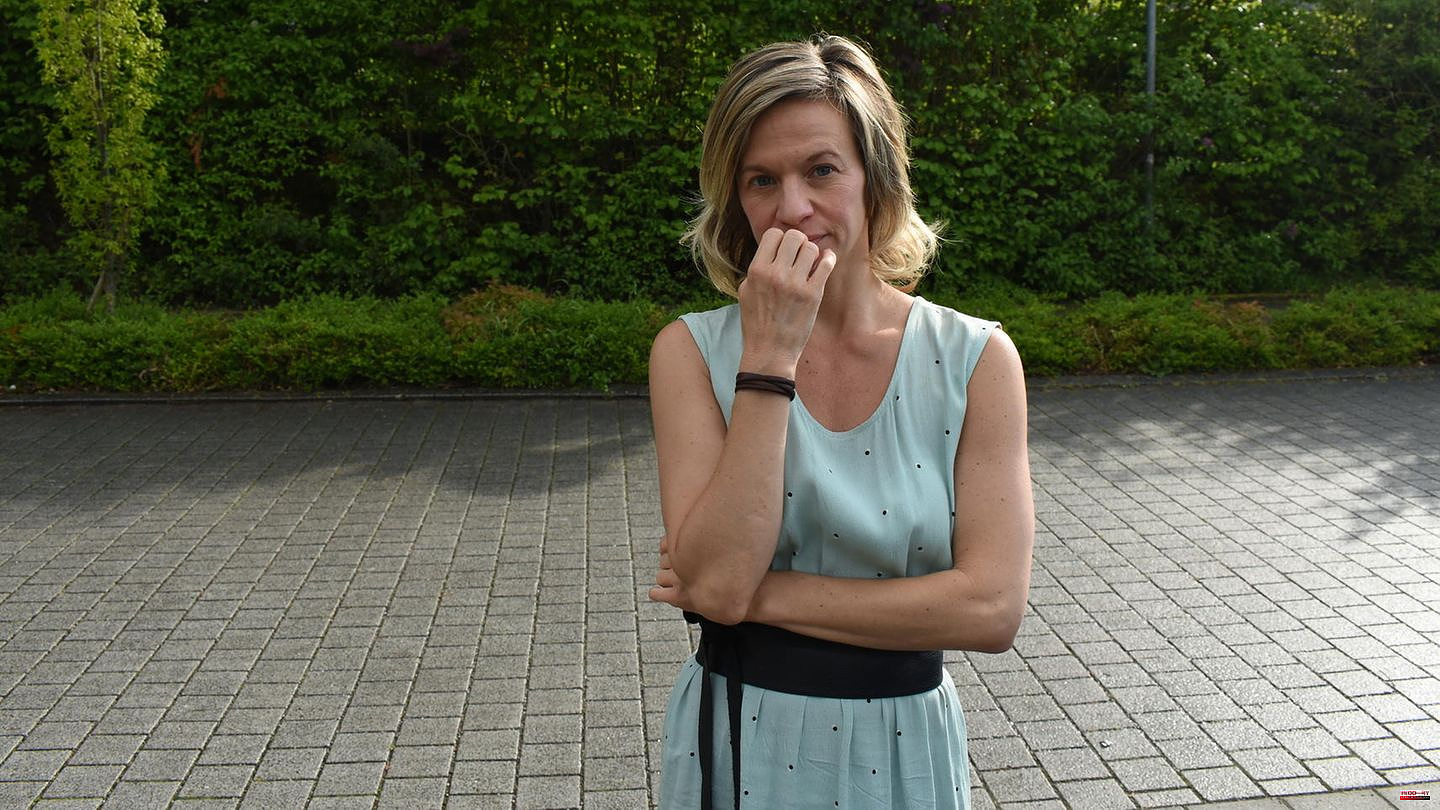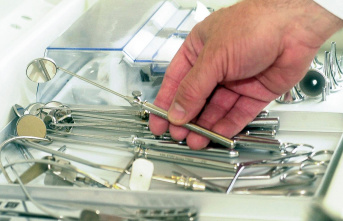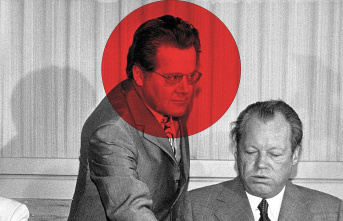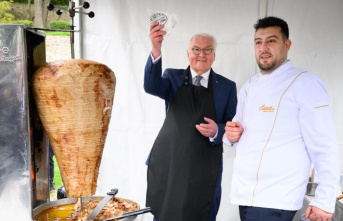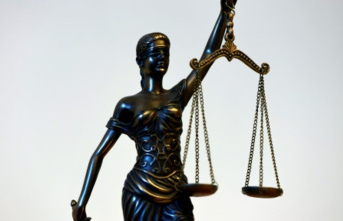Three-year-old Cleo lets the air out of her inflated cheeks with a snort. But the dandelion's white umbrellas don't come off. Christiane Dollmann strokes her daughter's fine blonde hair. "The flower is wet, so it doesn't work," she explains. Cleo and her mother have the same smile, same color of eyes, both seem happy and lively. "I'm always amazed at how much she has of me," says the 37-year-old. But she also sees her husband, Cleo's dad, in her daughter. Christiane Dollmann herself never met her father. She was conceived through a sperm donation.
The search for the donor, her genetic father, still occupies an important place in the life of the actress from Bad Rappenbau near Heilbronn. "It's like a black hole, a gap, a missing piece of the puzzle," she describes. "I want to know who this person is and look him in the eye." She kept her lineage under wraps for years before she began investigating the stranger.
"I grew up in a very loving, very open family," says the 37-year-old over coffee. The mother and her social father - the man she grew up with - are still among the most important people in her life. The day she found out about her conception didn't change that. At that time the family was on holiday in Sicily. They got into a pedal boat on the beach. What her father then said to her was burned deep into her consciousness: "Chrissi, I'll tell you something now, but I don't want our relationship to change as a result. You came about through artificial insemination." For a few moments there is silence. "Then I just made my eyes wide."
According to a study by DI-Netz, an association for families after sperm donation, around 1,200 children are born in Germany every year through sperm donation. In 1970, the German Medical Association officially approved semen distribution. Since then, reproductive medicine specialist Thomas Katzorke estimates, more than 125,000 people have been conceived through sperm donation. Artificial insemination has become a popular method of family formation for single women, lesbian couples and couples where the man is unable to have children.
However, only about 30 percent of "donor children" are informed about the conception by their parents. There are several reasons for the parents' silence. "The biggest concerns can be paraphrased with the word 'fear'," explains Petra Thorn, a family therapist specializing in fertility counseling. Parents say they want to protect the family. They fear social and psychological problems for the child, negative reactions from those around them or that the offspring could reject the social father.
Many parents believe that the origin story is not important for the child. A misjudgment, as developmental psychologists now know. Several studies have confirmed that genetic origin plays an existential role for humans. According to psychological research, it is considered an essential part of the foundation on which a person builds their identity.
Parents should therefore educate their offspring as early as kindergarten age. "This is the easiest time for children because they can then seamlessly integrate it into their self-image," explains Petra Thorn. The children grow up with the knowledge of family formation, which enables continuous identity development. "This prevents a traumatizing situation later on when children suddenly have to change an already established image of their family," says the expert. Christiane Dollmann was nine years old when her father enlightened her. To this day, he and she are still unable to explain why he chose this exact point in time for the interview.
The actress brought her old diary with her. She recorded her childhood experiences in neat lines drawn with a pencil. Even then, she was an optimistic person who tended to suppress worries. That's why she pushed her origin story aside. In the corresponding diary entry, the conversation "was only worth half a sentence," she says, and reads it out loud: "On the beach, Dad explained to me that I was born through artificial insemination and we played soccer with Marco."
Nevertheless, her father's sentence triggered emotional chaos in her. The word "artificial" made her feel like an alien. "I cried into my pillow at night," she recalls. A feeling of helplessness overcame her. For a while it still churned inside her, "but then it was no longer an issue in my life," she says. Even in everyday family life, the topic was no longer discussed after the holiday.
Probably also because the father had problems dealing openly with the sperm donation. "He will spend his life questioning whether it was right," the Swabian suspects. She also believes that the diagnosis of "infertility" for men who want to have children "is not easy to digest".
Family therapist Thorn agrees. Infertility is a stigmatized issue that can affect a man's self-esteem. The expert compares the time it takes to accept this to a mourning process. "You have to say goodbye to the fact that you can father a child." Only then can the man consider alternative methods and learn to deal openly with these issues. "Parents who educate their children at an early age are happy to have addressed this sensitive issue. That is a great relief," explains Petra Thorn.
Although Christiane Dollmann knew early on how she came about, she became interested in the sperm donor only during puberty. Very carefully, she asked her parents about it again. Together they would have looked for the documents of the treatment, but "the information was negligible". There was only one date and one place: Christiane Dollmann was conceived on October 1, 1983 in the fertility center in Wiesbaden. The parents asked the doctor who had performed the sperm donation. "The answer came that there were no more files," says the Swabian.
For years, it was common practice among reproductive medicine professionals to assure donor anonymity, although this was never actually allowed. As early as 1970, the legal advisor to the German Medical Association stated that the child born had the right to know the identity of the genetic father. In 1989, the Federal Constitutional Court recognized the right to know one's parentage. Knowing one's genetic origin has thus become part of the right of personality, which in turn is enshrined in the Basic Law. Despite this, anonymity remained an integral part of the "business model".
At that time, there was a ten-year obligation to keep the treatment documents. When families request information from medical professionals, they usually claim to have destroyed the data. The papers were said to have fallen victim to the shredder, fire or water damage. As a result, "children are thrown back to their powerlessness to this day," says Helga Müller, a family law attorney. That's exactly how Christiane Dollmann felt when she called the doctor herself. "I had a huge catalog of questions," she recalls. "But I was snubbed and got no answers." She only found out that the clinic had recruited many donors via notices at universities, mainly in medical schools - no clues that would help her in her search.
She doesn't have an exact picture in her head of the genetic father. "Only from his character traits," says Christiane Dollmann. However, she has no idea what he looks like. The Swabian has inherited most of the external characteristics from the mother anyway. The slender, fairy-like stature, the facial features, her distinctive nose. In contrast to her mother and her social father, she is very athletic. "And I'm sun addicted, I love warm countries," she adds. "So sometimes I thought he might be an athlete, or maybe an actor, or maybe he might be from the South," she enumerates. "It really burns me to know who this person is," says the 37-year-old.
The vast majority of "donor children" - around 80 percent - who know their genesis go in search of the genetic father in the course of their lives. Exactly as with Christiane Dollmann, curiosity drives the search in the first place. "They want to know where they come from, ask questions, clarify medical matters, get to know half-siblings, compare themselves," lists family therapist Thorn.
The latter aspect – meeting the donor and seeing where the inherited traits come from – is essential for many children to form their personal identity. By learning more about their sire, "donor children" hope to learn more about themselves.
Christiane Dollmann used a TV appearance on the subject of sperm donation to go public with her story for the first time. "I had sweaty hands like no other shoot," she recalls. She had previously asked her parents for consent. "My dad will always be my dad," the Swabian clarifies.
"Studies have shown that the bond between child and social parent is just as stable as between child and genetic parent," explains Petra Thorn. In retrospect, Christiane Dollmann describes the TV appearance as "the best thing that could have happened to me". Until then, no one in her circle of friends knew about her conception story. The actress was afraid that people would turn away from her or suddenly think differently about her. The opposite was the case. Friends would have admired her courage and shown understanding.
After the show ran, a number of people contacted her. Although the father was not among them, there were some helpful tips for the further search for clues. However, she found the step that actually got her further on the website of the "Spenderkinder" association, an association of more than 200 people conceived through sperm donation. Among other things, the association works to educate couples who are considering sperm donation and supports members in finding the genetic father and other relatives.
The association recommends a DNA test. That is exactly what Christiane Dollmann did. She was then able to feed the result into an associated database. "It was fun and exciting," she says. Especially when she was suddenly shown a person with a 25 percent overlap in heredity, a half-sister.
"I was trembling all over," says the Swabian. She contacted the supposed half-sister via the database. Weeks passed before she got back to her. A time that felt like an eternity for Christiane Dollmann. "When a straw like this suddenly appears after many years of searching, you cling to it," she says.
Finally the women phoned. The half-sister got the DNA test for Christmas and did it out of curiosity. Given the degree of relationship between the two, there were two possibilities. "Either her father donated sperm and I came out of it, or she is also a donor child and we have the same father," explains the 37-year-old.
Her conversation partner assured her that she herself was not a "donor child". "I found my father," thought Christiane Dollmann. A glimmer of hope that soon faded. During a clarifying conversation, the half-sister's parents revealed that she was also a "donor child". At the age of 38, she learned that the man she grew up with was not her father. "I was really scared I broke something," admits the actress. But her half-sister has repeatedly guaranteed that this is not the case and that she does not have to blame herself.
Just a month later, the DNA database again shows a human with a 25 percent match - a half brother. "Now I know two people who also come from this question mark," says Christiane Dollmann. The man, a dentist from Switzerland, is also looking for his father. The two have planned to meet face-to-face to talk about their respective search for clues - and thus to at least fill "the black hole" a bit.
The 37-year-old wishes her parents had considered that she could search for the genetic parent, that they had recorded the donor's details and had the documents ready. Not all children are interested in getting to know the genetic parent, according to family therapist Thorn. In any case, it is important for the parents "that they deal with it openly and leave it up to the child to decide what importance they attach to the donor."
The search has been made significantly easier for children who have been conceived through a sperm donation since July 1st, 2018. With a new law, the government has launched a central sperm donation register. The personal data of the donor and the recipient are entered there and stored for 110 years. Since then, "donor children" have been able to find out the father's identity without any problems. For those who were born before July 2018, the right to information is often no more than that. Legal procedures are long, complex and - if the doctor insists on destroyed data - usually not crowned with success.
How the parents deal with the topic is up to them. "Anyone who is considering donating sperm should be aware that an independent living being is being created with the desire to know where it came from," says Christiane Dollmann. In principle, she supports the possibility of a sperm donation. "Otherwise I wouldn't exist - that's so unthinkable," she says. The actress describes herself as a happy and cheerful person.
She is looking forward to meeting the genetic father with joyful anticipation. "There is such a great desire and a lot of love," she describes the feelings for the unknown man. "Maybe I'll be disappointed in the end and this person will always remain a stranger to me," she admits. She adds: "I would also like to say thank you to him." For being born and being able to start a happy family of her own.
"Hello, my big one!" calls Christiane Dollmann to the three-year-old Cleo, who picks her up from daycare. She bends down, spreads her arms, then Cleo throws herself into her arms. Christiane Dollmann picks another dandelion and hands it to her daughter. "Let's try this one," she says. The two blow off together.
Sources: Federal Ministry of Health, "Children and Society", "The Right to Know Parentage" in "Assisted Reproduction with the Help of Third Parties", "German Sperm Banks - Results of Three Surveys of the DI-Netz" in "Assisted Reproduction with the Help of Third Parties", DI -Netz e. V., "Starting a family for three - psychological and ethical aspects. The Donor Children Association" in "Assisted Reproduction with the Help of Third Parties", "Human Reproduction" (I), "Human Reproduction" (II), "Human Reproduction" (III), "Human Reproduction" (IV), "Human Reproduction" ( V), "Journal of Reproductive Medicine and Endocrinology", "Journal of Marriage and Family", "Donor choice and perception of the sperm donor by parents before and after donor insemination" "Assisted reproduction with the help of third parties", "The Psychology of Donor Insemination", Verein "Donor Children" (I), Association "Donor Children" (II)

